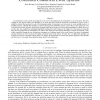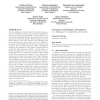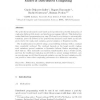506 search results - page 16 / 102 » Distributing synchronous programs using bounded queues |
148
click to vote
SOCA
2010
IEEE
15 years 26 days ago
2010
IEEE
In asynchronous event systems, the production of an event is decoupled from its consumption via an event queue. The loose coupling of such systems allows great flexibility as to ...
110
click to vote
CASES
2009
ACM
15 years 9 months ago
2009
ACM
Accurate estimation of the tick length of a synchronous program is essential for efficient and predictable implementations that are devoid of timing faults. The techniques to dete...
145
Voted
MICRO
2010
IEEE
15 years 28 days ago
2010
IEEE
SARC merges cache controller and network interface functions by relying on a single hardware primitive: each access checks the tag and the state of the addressed line for possible...
93
Voted
IANDC
2007
15 years 2 months ago
2007
ectly-synchronized round-based model provides the powerful abstraction of op failures with atomic and synchronous message delivery. This abstraction makes distributed programming ...
112
click to vote
IPPS
2006
IEEE
15 years 8 months ago
2006
IEEE
In this paper a novel job allocation scheme in distributed systems (TAG) is modelled using the Markovian process algebra PEPA. This scheme requires no prior knowledge of job size ...



